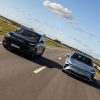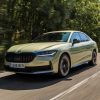
It turns out that the Renault Group itself is unable to quickly and cheaply develop a budget electric car.
< p>Renault announced the fourth generation Twingo in November last year and promised to bring it to market in 2026. The new Twingo will be electric; its design resembles the first-generation hatchback of the same name, but does not yet have technical features. Renault Group's existing in-house platforms are too expensive to meet the promised minimum price of just under 20,000 euros for the new Twingo.
 Renault prototype Twingo fourth generation
Renault prototype Twingo fourth generation
Immediately after the premiere of the prototype of the “fourth” Twingo, rumors began to spread that it would become related to another new model of the smart brand, which is now under the control of the Chinese holding Geely. Such a partnership seemed quite logical, because the third generation Twingo, still produced at the Slovenian Renault plant in Novo Mesto, and the smart forfour, discontinued in 2021, are twin brothers developed in cooperation between the Renault Group and the Daimler concern. , which, in fact, transferred the smart brand to Geely in 2019. However, rumors about the resumption of cooperation between Renault and smart turned out to be false.
 Prototype of the fourth generation Renault Twingo < p>Renault Group and Geely now have an engine joint venture, an agreement on it was signed last summer, and today its name was announced — Horse Powertrain Limited, headquartered in London. Horse Powertrain will develop and produce new generation internal combustion engines and hybrid powertrains, while the development of the new Twingo will be overseen by Renault's Ampere electric vehicle division, which was created in 2022 and has no connection with Horse Powertrain. Renault initially planned to turn Ampere into a separate company and take it public, but changed its mind earlier this year, rightly deciding that attracting outside capital to Ampere in the face of a global slowdown in demand for electric vehicles would not be possible.
Prototype of the fourth generation Renault Twingo < p>Renault Group and Geely now have an engine joint venture, an agreement on it was signed last summer, and today its name was announced — Horse Powertrain Limited, headquartered in London. Horse Powertrain will develop and produce new generation internal combustion engines and hybrid powertrains, while the development of the new Twingo will be overseen by Renault's Ampere electric vehicle division, which was created in 2022 and has no connection with Horse Powertrain. Renault initially planned to turn Ampere into a separate company and take it public, but changed its mind earlier this year, rightly deciding that attracting outside capital to Ampere in the face of a global slowdown in demand for electric vehicles would not be possible.
To reduce the costs of developing and producing the new Twingo, Renault tried to cooperate with the Volkswagen concern, whose plans also include a budget electric car with a price tag of 20,000 euros, but negotiations on this matter did not lead to anything. Volkswagen announced earlier this week that it will develop its budget electric car in-house and unveil it in 2027.
Yesterday, Automotive News Europe, citing a Renault representative, reported that the development of the new Twingo was entrusted to a certain Chinese engineering company, whose name was not disclosed. The reason for such outsourcing is stated very honestly — “to reduce development time and costs.” However, Renault will be responsible for the design of the new model (that is, it will be more or less similar to last year's prototype), and production will be established in Europe — most likely in Slovenia.
Let us add that the Romanian brand Dacia, owned by the Renault Group, sells the recently updated electric cross-hatchback Spring in Europe at a price of 16,900 euros, but this model is produced in China.
The Citroen brand, owned by the Stellantis corporation, at the end of the past year launched the electric cross-hatchback e-C3, assembled in Poland, for 23,300 euros and promises an even more affordable version in 2025 for 19,990 euros. In addition, this fall Stellantis will localize production of the Chinese electric hatchback Leapmotor T03 in Poland, which will also have a very aggressive price tag — that is, probably up to 20,000 euros in the basic configuration.
The Chinese company BYD promises the following year to bring its budget electric hatchback Seagull to the European market and is building a plant in Hungary that will produce electric passenger cars and start operating in the second half of 2025.
In general, in the coming years there will be a fairly large selection of inexpensive electric vehicles in Europe with a price tag of around 20,000 euros, but it is not a fact that they will be in high demand.






















































Свежие комментарии